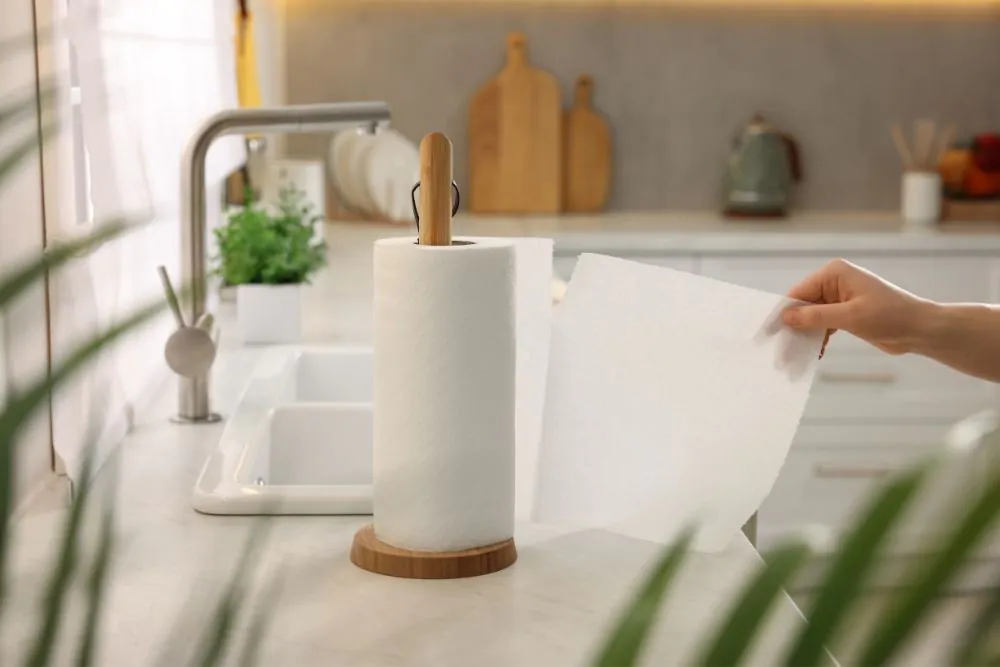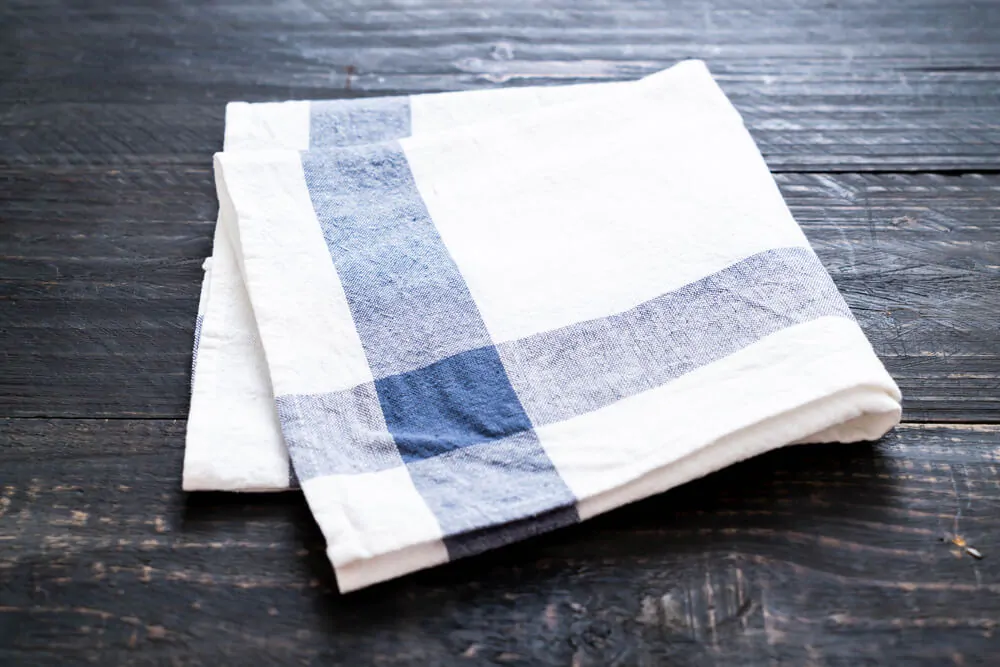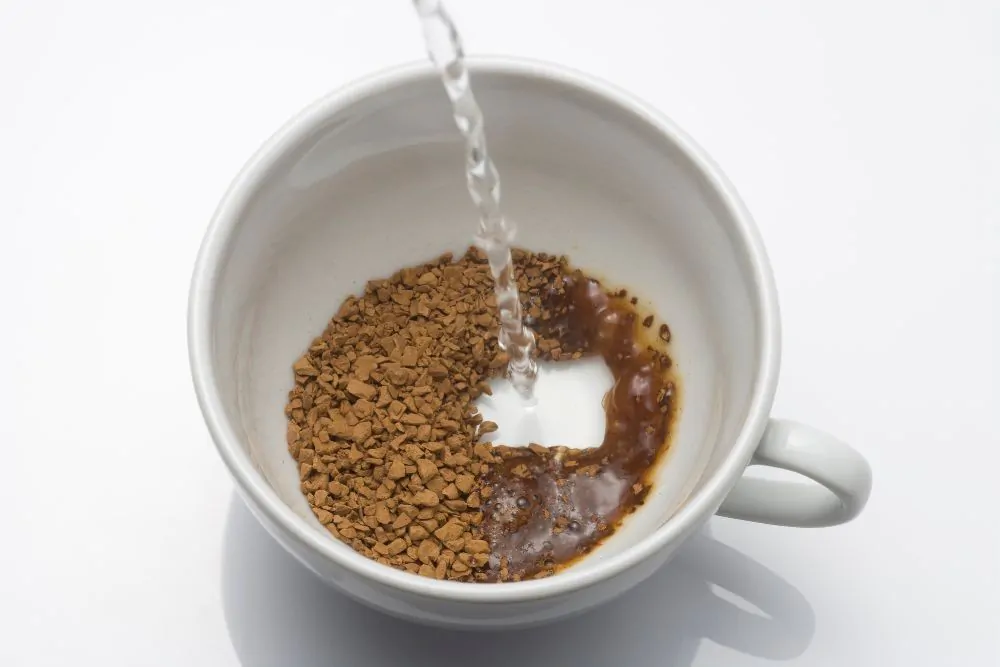This article answers an unusual question: can you use a paper towel as a coffee filter substitute? We propose some ideas for improving the taste if you’re out of options.

You lazily walk into the kitchen with disheveled hair and eyes half-open to brew an aromatic pot of java, only to realize that you are out of coffee filters. Almost every coffee enthusiast faces this predicament when there is not enough time to rush to a store to get filters, and you also don’t want to go to the coffee shop.
So can you use a paper towel as a coffee filter? A paper towel is a great quick fix if you’re out of coffee filters. Your coffee filter has a lot in common with paper towels; they are usually the same thickness, the same base material, and will both catch the coffee grounds. However, most paper towels will not be as sturdy as a coffee filter, so they won’t work for large batches of coffee.
How To Use A Paper Towel As A Coffee Filter
It’s easy to use a paper towel as a coffee filter. Simply, follow the steps below:
Step 1: Lay a full-sized paper towel flat over a table.
Step 2: Fold the paper towel in half vertically.
Step 3: Fold the paper towel into another half. It should look like a square.
Step 4: Take the folded paper towel and use the open ends to create a pocket. Open the pocket and put it into your cup facing upwards.
Step 5: Put your favorite coffee grounds inside the pocket.
Step 6: Fold the outer edges to ensure the lid closes completely.
Step 7: Slowly pour hot water into the filter cup and let the coffee drip into the pot.
Step 8: Remove the filter and enjoy your morning coffee.
Environmental Impact
Opting for paper towels as coffee filters may affect the environment. Paper towels, being single-use, result in increased waste compared to multi-use coffee filters. Creating paper towels requires deforestation, water, and energy, leading to a greater ecological footprint than other alternatives.
Thus, if sustainability is a priority, we recommend picking a reusable or metal coffee filter to prepare coffee.
Are Paper Towels Food Safe?
Most paper towels are bleached. You may be worried about unwanted chemicals leaching into your coffee, but in most cases, the contaminants are not severe, and the health risks are negligible with infrequent use. Coffee filters are bleached too.
Bleached coffee filters are produced either through the use of chlorine or oxygen.
Recycled paper may contain contaminants from the manufacturing process. These contaminants, such as strengthening agents, fillers, and dyes, have rarely gone through toxicity testing. Some papers may even contain phthalates, Bisphenol-A (BPA), and other hormone-imitating chemicals.
Food regulators approve these products because they believe the paper will not come in contact with our food. When the paper is recycled, contaminants can also get recycled with the wood pulp, resulting in traces of chemicals in recycled paper towels. Recycled paper towels are better for the environment, but they shouldn’t be a replacement for proper coffee filters.
Emergency Coffee Filter Alternatives
Many coffee enthusiasts may not approve of paper towels as a substitute for paper filters, so here are some other options.
1. Cheesecloth
Cheesecloth is a cotton cloth used to make cheese. They come in different grades ranging from very fine to open. To brew coffee, use the same method as mentioned for the paper towels.
The biggest advantage of using cheesecloth as a substitute is that the fabric is stronger than paper towels and will not tear when brewing. On the downside, not many people have cheesecloth as easily available as paper towels. Even if you do, you will need to cut it and discard it after one use.
2. Cloth Napkin

If you have no paper towels, you may use a dishtowel or a clean cloth napkin to brew your coffee. To use a cloth napkin as a filter, set it on the drip basket or pour over (you may use a rubber band to secure the cloth on the top while letting it slightly droop inside).
Put two tablespoons of freshly ground coffee inside the napkin and slowly pour hot water into it. Carefully remove the cloth napkin and rinse the cloth after brewing.
The advantage of using this method is that almost everyone has a clean towel somewhere in the house. The cons include the probability of staining and the coffee spilling through the towel onto your countertop. The towel could infuse tastes and aromas into your brew if you use a particularly strong laundry detergent.
3. Mesh Sieve
Another way to save your mornings when you run out of coffee filters is using a mesh sieve. To use this option, put two tablespoons of coffee grounds and hot water in a mug. Let it sit for five minutes or more if you prefer a really strong coffee, and then pour the coffee into a mug using a fine mesh sieve.
The advantage of using this substitute is that it is extremely scalable, and you may brew a whole pot of coffee using this method. On the downside, a mesh sieve cannot catch fine coffee grounds and does not retain the oils that are usually absorbed by the filters.
4. Gold Filters
If you regularly forget to stock up on paper filters, then it’s time to consider reusable filters. Gold coffee filters are made from stainless steel that is covered by gold plating. Swiss gold coffee filters, for instance, are made from 23/24-karat gold, which makes them more durable.
Real gold plating is also used in these filters since gold doesn’t react with coffee or create undesirable additional flavors. These filters are produced through an electroforming process and contain a very fine mesh that holds back most of the sediment of the coffee while allowing coffee oils through.
One of the reasons people like coffee filters is that they can absorb compounds such as diterpenes, hydrocinnamic acids, and polyphenols. Diterpenes have been linked to an increase in bad cholesterol, but the latter two are antioxidants.
Paper filters are far more absorbent than gold filters, but if you don’t drink excessive amounts of coffee daily and are generally healthy, this shouldn’t be much of a cause of concern. Best of all, a reusable filter, such as this one, is better for the environment as it can last for years with good care.
Paper filters come in all shapes and sizes, from V-shaped for automatic brewers, square-shaped for the Chemex, and basket-shaped for flat-bottom pour-overs and some automatic brewers. When committing to gold filters, ensure you’ve purchased the right one for your brewing method of choice.
5. Instant Coffee

If you don’t have access to dedicated coffee brewing equipment like a French press and dislike using filters, then opt for instant coffee. Sure, it won’t taste as nice, but it’s easier and faster to make, and you won’t need filters of any type. Read our guide to the best instant coffee brands.
FAQs About Using A Paper Towel As A Coffee Filter
Can you use a paper filter with a permanent coffee filter?
If you want to separate coffee grounds more effectively from your cup of coffee or have high cholesterol, you can use two kinds of filters at once.
Can you use a paper towel as a tea filter?
Yes, you can use a paper towel as a makeshift tea filter in a pinch. It’s not ideal as it may change the taste and even tear if you don’t handle it gently. Proper tea filters or a fine mesh strainer are better for brewing and straining the tea.
Can you filter water with a paper towel?
Yes, a paper towel can filter out large particulates from water. However, it won’t remove microorganisms, chemicals, or dissolved impurities. For safe drinking, using a proper water purification system or buying filtered water is easier and cleaner..
See Also:
DO COFFEE FILTERS FILTER WATER?
CAN YOU USE COFFEE FILTERS AS CUPCAKE LINERS?
CAN COFFEE FILTERS BE COMPOSTED?
